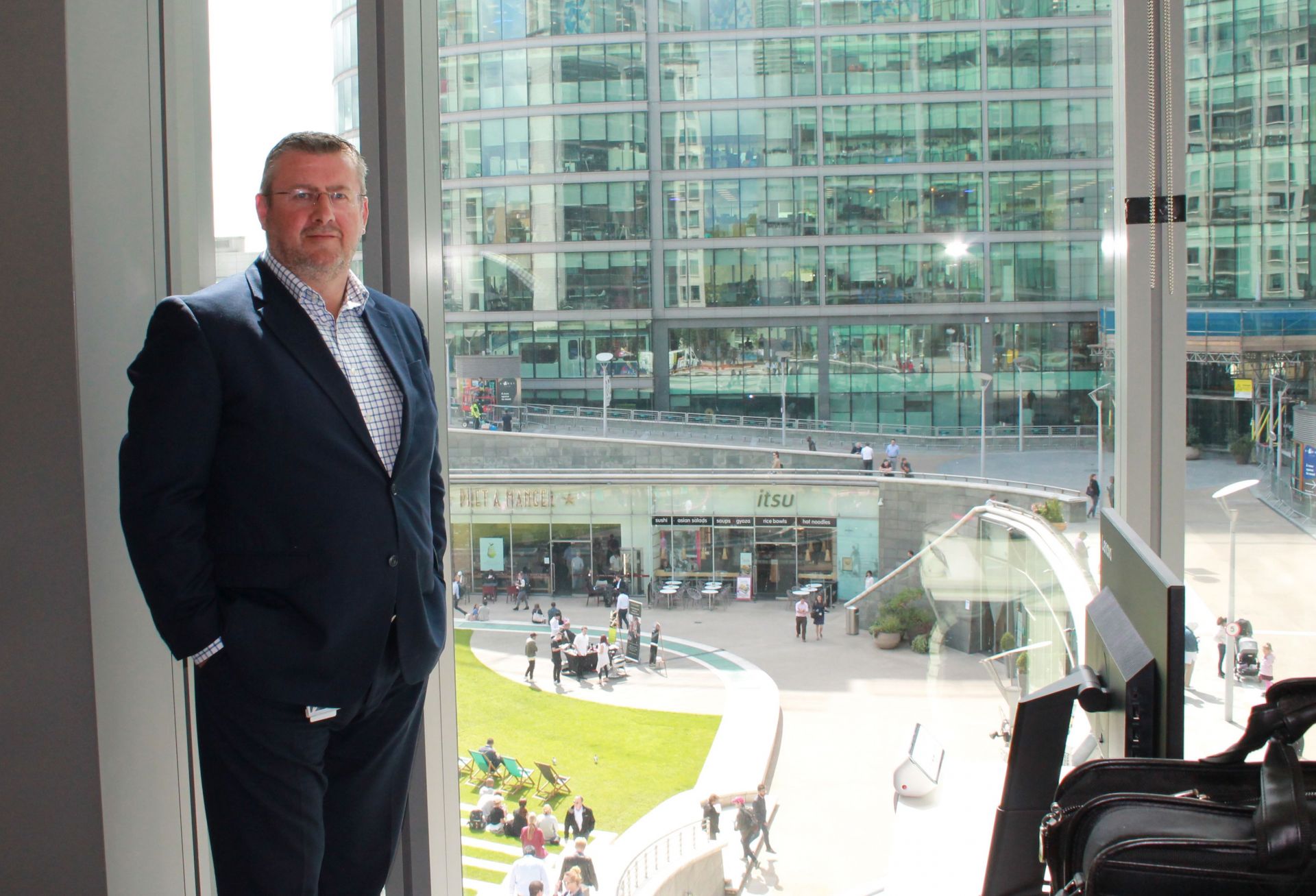THE KEEPER OF (5G) SECRETS
Image credit: © Maksim Pasko - stock.adobe.com
From writing code for financial markets to heading up one of the most influential companies for the 5G era. Cormac Whelan talks Elliot Mulley-Goodbarne though his journey and what he believes the future may hold.
You may be sick to the back teeth of 5G already. With hype reaching an all-time high but so little to warrant it until this year, at least we now have a product to grasp so to speak.
“5G is actually ahead of plan in terms of when that next generation technology sequel was thought to be landing” said Nokia’s UK&I CEO Cormac Whelan.
I think it was late 2020/2021 that adoption was predicted but with the spectrum auctions and the need for operators to find new revenue streams and commercial models we saw a big push in 2018 and 2019 into advanced 5G roll out.”
The fifth generation of mobile connectivity is nothing new to Whelan. After serving with Nokia since January 2016 as part of the acquisition of Alcatel-Lucent, 5G is a subject he is well versed in.
“What is today's reality? 5G will bring faster pipes, fatter pipes, lower latency, faster churn out time so the things that we do today we can do more of and quicker. So capacity and latency will be the two initial uses and, down the line, capability holds quite a lot of opportunities.
But unlike a lot of previous technology, in general 5G coming along does not throw out the old and start with the new, it’s very much the opposite, it is a very collaborative, integrative technology.
You need a really good 4G infrastructure to run 5G infrastructure. 5G will not be replacing all the Gs before but I think eventually we will start to see the operators turn off 3G because 4G and 5G will replace all its functionality and capability and be integrated into the network.
So it's not a throwing out of all they've been working on and using 5G instead. There's clearly still a big investment curve for operators and one of the challenges is that in the past there has been a long time between the first ‘G’ and the second ‘G’, the second ‘G’ and the third ‘G’.
That time period has been getting shorter each time as technology evolves quicker, so the return on investment for operators is more difficult financially because they’ve got a shorter time to get that return on investment before the next investment cycle comes along. I think that's true in this case as well with 4G and 5G window but because 4G is required to maximise 5G it's not your being wasteful of the 4G investment.”

“There's clearly still a big investment curve for operators and one of the challenges is that in the past there has been a long time between the first ‘G’ and the second ‘G’, the second ‘G’ and the third ‘G’. That time period has been getting shorter each time as technology evolves quicker, so the return on investment for operators is more difficult financially”
HISTORY REPEATING ITSELF
It may be a tad hyperbolic to say that Britain, along with the rest of the global technology community, is standing at the precipice of a revolution, certainly Whelan doesn’t give such language a lot of time.
That’s as you would expect from someone who’s had to put up with 30 years of new technologies, products and standards, all with their own hype machine in tow. However he does admit a certain sense of familiarity when it comes to 5G.
During his tenure at BT that lasted almost a decade, Whelan says that he saw the rise of broadband and can draw parallels to today.
“When I joined BT September 2001 the term ICT was being used a lot because we just seen the convergence of the information and IT world and the computing and technology world.
It was about the convergence of IT in computer technology areas. Data centres were the ‘in’ thing and people are building data centres in Canary Wharf and the city and data centre companies were one of the big things to be invested in.
Then there was a realisation - I say realisation, people in ICT knew - that all of this has to be connected. So broadband became one of the most important things for the incumbent telcos.
The 5G hype is really going to be about what is it going to bring next? Faster and bigger we get, but what's that going to look like?
Broadband became a big thing at the time because there was a realisation that connectivity was required for all the other things that we were talking about. I think we are now seeing that again with fibre and the use of the word ‘broadband’ is now a collective noun for high speed connectivity.”

EARLY VALUE OF SPECTRUM
Cormac’s interest in technology was first sparked by an after school class where he learnt to code.
Borrowing his friend’s Sinclair Zx Spectrum he wrote programs in his spare time ending up with a job in the financial district in London.
“Back in the day, when I was starting computer programming the IBM computer hadn't been invented. I left school in 82 and the IBM PC I think came out in 83 so we're talking a little bit of a while ago.
I got my degree in advanced computer programming from Trinity College in Dublin but actually in my last year at school my plan at the time was to do business economics and accounting.
I got to the end of school and repeated some exams at a different college that offered opportunities to go and do computer programming training. I thought that sounds fun and a friend of mine leant me his Sinclair Zx spectrum in colour which was amazing.
I sat writing little programmes at home and thinking this is quite fun, I did a government apprentice training scheme, I got a job and then did my degree at night for the first three years.”
Using that degree, Whelan then set out writing programs for financial dealing desks in Dublin, semi-automating what was a very pen, paper and calculator-orientated environment before moving to the UK and eventually landing in the network management division at Motorola named Codex.
“We realised that all the formulas that money traders use were quite similar. You could do the calculations based on a certain number of factors and plug them into the main computer and all you had to do was type in numbers.
I moved to the UK in 87 because that's where all the leading financial markets were and that was the place to come. Software was happening but ironically after doing the degree and doing 4 1/2 years of computer programming I decided that I didn't particularly like computer programming.
It's fine when you're inventing new stuff but it's not so much fun when 4 years later you're maintaining the same code. By chance I had an opportunity to join Motorola in the data comes division which at the time was called Motorola Codex.
They just invented network management systems for the companies and they had a whole lot of engineers that were brilliant, but all these systems turned up which run on software. So they needed software people and I found myself running network management systems in terms of product support and marketing. From marketing I went to sales.
I loved it there, I spent about 9 1/2 years at Motorola and I saw a lot of the world with them which was great and that's how I ended up in the comms business really. From there I went to a competitor of theirs in US Robotics and from there I went to a networking company as part of AOL.”
Whelan describes the comms scene entering the noughties as a “whirlwind” where he saw valuations of companies rise and fall for three years before accepting a job offer at British Telecom.
“AOL had a division called ANS (Advanced Network and Services) and they decided they would set up an international version and started with the UK. They were small company based down near Gatwick when I joined there and then the next 3 years are an absolute whirlwind.
We are talking late nineties, early noughties where telecoms companies’ valuations were going ballistic. Companies like Qualcomm’s worth was changing on a weekly basis, the stock market was going crazy and I ended up in this small company that ended up being bought by another company where, for the next 3 years, my feet didn't touch the ground until the .com bubble burst.”
By the time that burst occurred Whelan was at BT and, after the best part of a decade, he decided to “do his own thing” for a while and set up a consultancy business, named after his daughter Alanah, where he was able to give smaller businesses the insight into how the larger corporates would tackle the problems they are having.
“I went off and did my own thing for a year after BT. A little bit consultancy, but my sole goal was that I wouldn't do consultancy work for a telecoms company or a big company. I would take some big company learning and apply it to the SMEs around business strategy and growth plans and that sort of stuff.
I had a ball doing it, I love being able to meet with the owner of the smallest company, by the morning understand what the problem was and by the afternoon we were executing some plans on 2 or 3 steps stages on strategies on how to turn things around.”
“Mobile connectivity world and the fibre world coming together is going to change the connectivity capabilities for industry. I think that's where we'll see the very last change in the use of communications technologies to drive industrial models”
KEEPING BRISTOL OPEN
Consultancy didn’t last long though and in 2011, before it was bought by Nokia, Whelan joined Alcatel-Lucent and subsequently became CEO of UK and Ireland for the Finnish giant in 2016.
At the end of 2017, Nokia teamed up with the University of Bristol and Bristol is Open to explore smart city applications as well as 5G uses. Whelan added that such a project was “a naturally innovative thing for [Nokia] to be involved in.”
“Nokia has always been an innovative company so something like Bristol is Open looked like a visionary thing for us to be involved in. We have an office space in Bristol so it seemed logical for us to get involved in this next-gen thinking.
The government has also had the foresight to start investing some money into smart city trials, some pre-5G trials for smart cities, and Bristol was chosen as one of those that were part of that.”
Now Nokia is also working with a port in Hamburg on a smart city project with Whelan pointing to examples in Singapore and Dubai where the concept has taken off.
“On the industry side, I think the mobile connectivity world and the fibre world coming together is going to change the connectivity capabilities for industry. I think that's where we'll see the very last change in the use of communications technologies to drive industrial models.
To technologically industrialise a city will turn it into another industry. Then we are going to start seeing this smart city industry, with a lot of things that just don't exist today, but new applications, new requirements and driving all of these challenges is going to be new commercial models.
So the work we are doing with Bristol is Open is testing various parts of 5G technology in readiness over the years with things like traffic pattern matching but pedestrian traffic pattern matching more than the vehicles, looking at pedestrians use of walk ways roadways, traffic lights at peak times and non-peak times and is their ability with soft analytics to divert people.
So instead of everyone walking down the same High Street, if you diverted people at five o'clock to the train station by walking a different route, do you reduce congestion? Can you change traffic lights synchronization to increase efficiency? Do you reduce accidents or the risk of accidents?”
Use cases found in Bristol also extend to the monitoring of pollution levels in the city and, one of the biggest buzzphrases associated with 5G, autonomous vehicles.
“There are apps to measure the air pollution levels in Bristol using sensors put on lamp posts and street furniture around the city and the idea being that, for example, a mother with a child who has asthma could check on an app whether the pollution is too bad for her child to go to into town.
You take those sensors to an industrial scale and a you have a new automated trucks industry with online journey routes like in the US, where you have 1,000 miles of open highways and not a lot in between.
That becomes a bit difficult to get those vehicles into the centre of Cardiff or Manchester under traffic systems but that creates a whole new question of whether we have large depos based outside of cities? I think we are already seeing that with an Amazon site model and I think there are still loads of different things yet to be invented with this technology.”
“There are whole new models that don't exist yet that will come to light that this new technology will enable. I think you have a lot of market economy forces at play. If there is a need and people want something, then the question is: Is there value to pay for something? If there is then the market will thrive.”
PAYING FOR IT
However the UKI CEO is not unaware of the question of who will build this infrastructure? Despite the UK government and Ofcom targets and initiatives, fibre coverage in the UK that 5G will depend on, is low and those companies in control need a reason to branch out.
“You can do these things now that you wouldn't be able to do before, the question is how to commercialise it and who pays for it?
That app monitoring pollution, is that a council service? Is it coming out of your council tax? Do you outsource it to a third party commercial technology company too write it and they get a fee? Will you need to pay to download it off your App Store or pay for the app or is it provided by the council? There are whole new models that don't exist yet that will come to light that this new technology will enable.
I think you have a lot of market economy forces at play. If there is a need and people want something, then the question is: Is there value to pay for something? If there is then the market will thrive. If there isn't then maybe they won't.
If the government believe that it is something that actually needs to happen but there isn't a commercial model for people to invest their money in from an industry point of view then that is where government needs to step in.
We are seeing this with rural broadband programmes. Despite incentives and all the pushing and the needs, at the end of the day we need government to step in and provide funding for rural broadband funding because economically it couldn't be done by an operator.”





